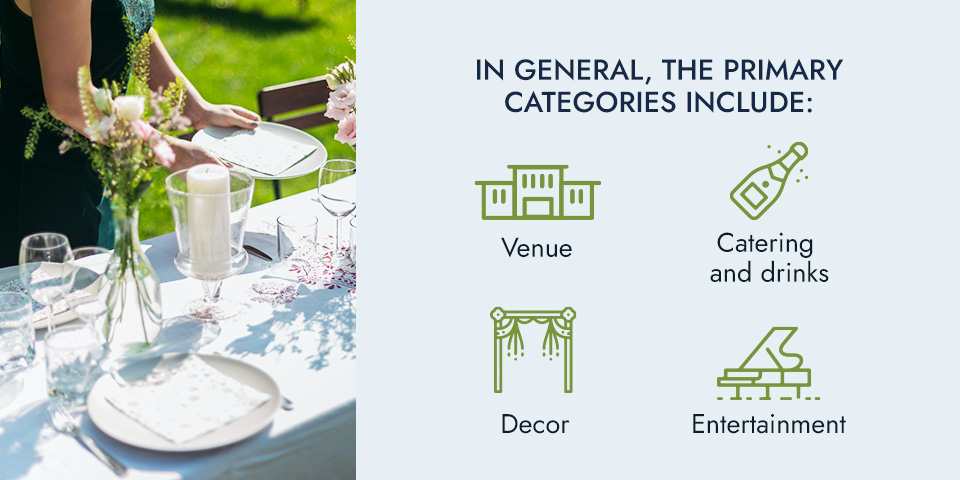
Whether you’re planning a milestone birthday party or an office holiday gathering, establishing and sticking to a budget can be a tricky task. We are exploring a few helpful tips to learn how to create a budget for an event that’s manageable and highly effective.
Before you can start budgeting for an event, you need a clear understanding of the event’s objectives. Someone planning a corporate event will likely have different goals than someone prepping for a bat mitzvah, so it is essential to start here.
Consider the scale of your event and how grand it needs to be. What do you want to accomplish? Are you looking to have a massive celebration or something more intimate? How important is decor and transforming the event space? Is the party aimed at generating revenue?
Understanding the general objectives and purpose of the event will help you gain greater clarity of a reasonable budget.
Depending on the kind of event you are planning and the resources available to you, learning about the costs for past events can help gauge an accurate budget for yours. Researching past events can provide valuable insight into how much others have spent, general cost breakdowns and revenue opportunities.
By learning from past events, you can also determine what different elements are likely to cost and which will leave the biggest impact on the event’s overall success.
How do you stay on budget for an event? Establishing your maximum spending limit and working backward.
Once you have a general idea of the objective and scale of your upcoming event, consider how much money you have readily available to spend. Determining a finite maximum will help you ensure the small tweaks made to different areas of the budget are balanced, and you do not overspend.
If you are hosting a money-making event, you may need to consider factors like ticket sales and sponsorships when establishing your spending limit.
Breaking down your budget into your major spending categories is essential for creating a comprehensive budget that is easy to manage.
The type of event you’re hosting will determine where you will allocate your funds. In general, the primary categories include:

You may also have a marketing budget, transportation, staffing costs and other essential spending to keep in mind. Whatever the major spending categories are for your special event, keeping track of them will help you understand your budget breakdown and adjust spending accordingly.
Planning and hosting an event involves many moving parts, and one small error, surprise or issue can cost you. When establishing your event’s budget, always set aside some money in case of unforeseen expenses — you’ll thank us later!
Setting aside a contingency fund can help you keep peace of mind and know that if any last-minute changes take place, you can cover their expenses without compromising the rest of your carefully planned budget.
If the budget you’ve created doesn’t quite align with the event’s scale, you can get creative in finding ways to cover the costs. Consider pitching sponsors and using the event to promote their offerings. They may be able to provide you with financial assistance in exchange for things like:
If you’re not sure you can deliver the experience you want for your guests at your special event, sponsors can help you manage and stretch your budget.
As you reach out to vendors for your upcoming event, remember to shop around before making a final decision. Get quotes from multiple businesses that offer the same types of services. Compare and contrast their service offers and fees. Remember not to choose the cheapest option solely based on price, and look for a choice that is both cost-effective and beneficial for your event.
Getting multiple quotes is a great resource for negotiating better deals and ensuring you are getting the most bang for your buck. You may find you can save money without forfeiting a quality experience by working with certain vendors.
An important tip for creating and sticking to an event budget is to prioritize your spending.
Your event is special, and determining the most important elements is key to ensuring you allot the right amount of your budget to the things that matter most to your guests. For example, a corporate networking event may not need a massive budget for an audiovisual setup and a bridal shower probably doesn’t require extensive catering.
By prioritizing your spending, you can ensure you allocate larger portions of your budget to the elements of your event that are critical to its success.
Keeping an organized budget format for an event is key to managing and controlling your costs. You can use a spreadsheet or specialized software to track every dollar going in or out for your event.
Record important figures like guest count, ticket sales, vendor payments and sponsorship contributions. Having a clear way to track and organize each transaction is key to monitoring your spending and staying on budget throughout the entire planning process. Plus, you can use these insights for reference if you find yourself prepping for another similar event in the future.
The venue is one of the most significant elements of any event and often takes up a larger portion of the overall budget. When exploring different venue options, ask if they offer any event packages.
These packages can help event planners take control of their spending and know exactly how much things will cost without any last-minute surprises. Plus, some venues will offer exclusive services and discounts if you select one of their packages, which can elevate your event and streamline the planning process.
Coordinate with your venue and inquire about any special discounts or services included. At Colonial Golf & Tennis Club, we offer different catering packages with our in-house caterer to streamline coordination and deliver the best event possible.

Whether you’re hosting a formal banquet or a playful family party, Colonial Golf & Tennis Club is your go-to destination for hosting your next special event. We are located in Harrisburg, Pennsylvania, and, in addition to our recreational offers like tennis, golf and aquatics, our venue has different rooms that are perfectly suited for any type of celebration.
At Colonial Golf & Tennis, our planning and catering team is here for you. We’ll make planning your event, sticking to your budget and curating a delicious menu for your guests a breeze.
Contact us online to start planning your next event today!